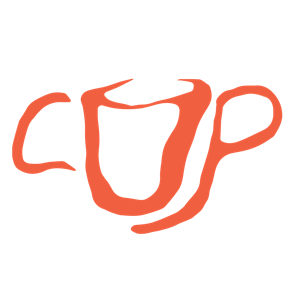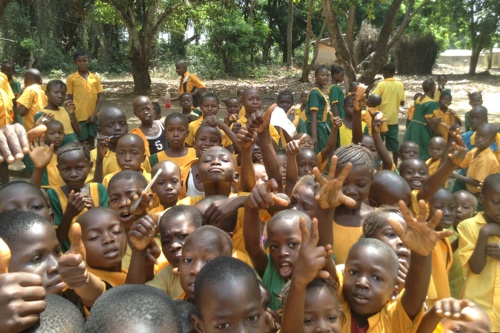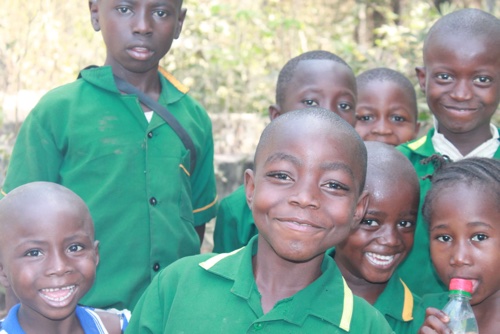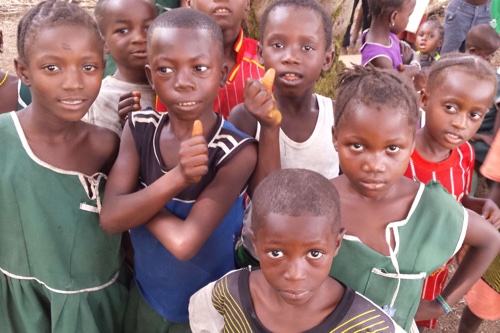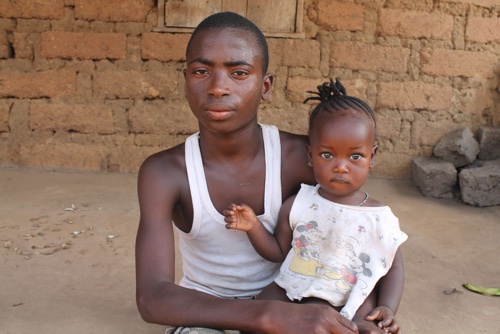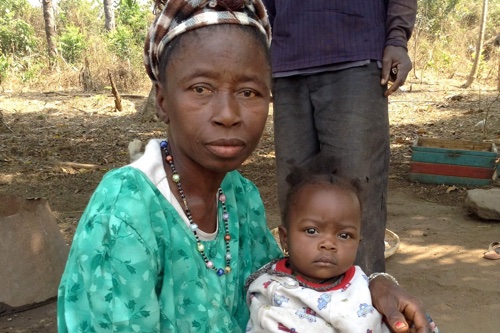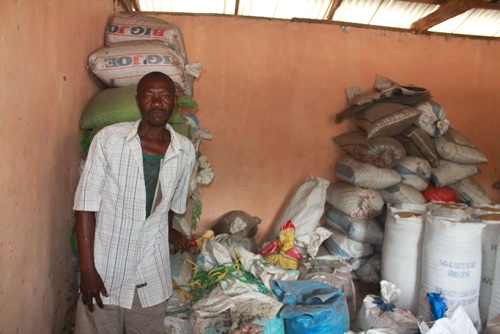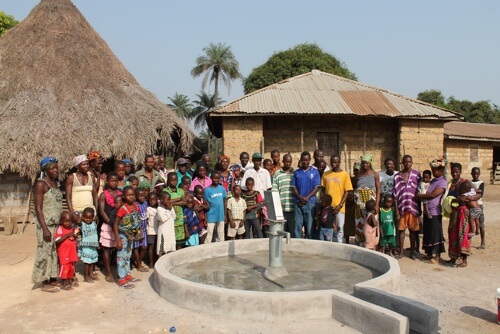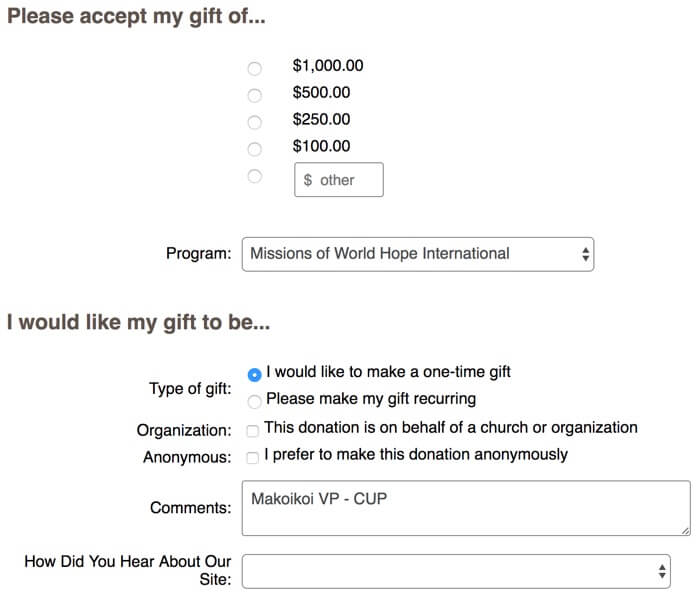Activity Summary
VILLAGE DEVELOPMENT COMMUNITIY (VDC)
WHI works with each village to form and train a Village Development Committee (VDC). Community members elect trustworthy people of good reputation to serve on the VDC, including religious leaders, chiefs, farmers, and women. The VDC works with WHI to encourage participation in development activities, steward project resources and hold their community accountable. The committee strategizes about future development planning and discusses solutions to current problems, acting as the primary change agent in the village through collective action.
GOATS AND ANIMAL HUSBANDRY TRAINING
When the need is identified, goats are provided to villages, along with training in animal husbandry. In order to maintain a stable year-round income, it is important farmers raise different types of animals that can survive drought periods, are easy to manage, and hardy. Not only can goats survive in harsh conditions, but they reproduce faster than other livestock and there is a strong market for goat meat. Goat procurement and production is important to improving food security in rural communities.
DRILLED WATER WELLS
Borehole (drilled) wells provide a consistent source of clean water year-round, a welcome reprieve from hand-dug wells. A hand-dug well goes dry at the peak of the dry season, forcing villagers to use water from a contaminated source. This leaves the communities vulnerable to preventable water-borne disease. A drilled well allows villagers to drink and wash, year-round, without fear of sickness.
ESTABLISHED SEED BANKS
Seed banks provide a constant source of seeds for a village. When it is time to plant, farmers receive a portion of seeds from a seed bank which is managed by the VDC. After harvest, farmers return the amount of seed they were loaned from the group with minimal interest. Seed banks mobilize community resources to provide for the common good, strengthening the entire village.
LATRINES
Proper waste facilities are necessary for reducing preventable disease caused by poor hygiene. Latrines are constructed, typically for each household, and training for proper care and maintenance is provided. When individuals don't have a toilet to use, human waste gets into the water supply, often the same water supply that people use for drinking, bathing, cooking, and cleaning. This contaminated water carries deadly diseases.
DRYING FLOORS
A drying floor allows seeds to be properly dried, bringing long-term benefit to a community and significantly reducing post-harvest losses of staple crops. Rice, peanuts, peppers and other crops are spread on floors to get maximum sun exposure and to reduce moisture so that they do not mold during storage. Villages without a drying floor are forced to dry their seeds on the ground where they’re mixed with small pebbles and exposed to bugs and other pests. A drying floor allows for higher yields to save and to use for income generation, an important source of food security.
HEALTH AND HYGIENE TRAINING
Soap is distributed to families, complemented by instructions to wash hands after using the toilet and before eating. Demonstrations are conducted on effective hand washing techniques and village members are trained in the proper disposal of human waste. A monthly cleaning schedule is created as a constant reminder to the community. These measures have a broad impact in the village and improve the health of all.
MOSQUITO NET DISTRIBUTION
Malaria poses a constant threat to the villagers. Mosquitoes that carry the disease are most active at night. By sleeping under an insecticide treated bed net, the risk of contracting malaria is reduced. Mosquito nets are distributed to every household with children under five years of age or a pregnant woman. The nets are accompanied by awareness and prevention training, which motivates families to use the nets for maximum health benefit.
POULTRY PROJECT
Families are assisted in constructing poultry houses and chicks are distributed. This improved breed of chick lays more eggs, providing for better nutrition and yielding surplus eggs for sale. The income gained from the sale of eggs is used for livelihood support and to pay school fees for children. More eggs also means more protein in the diet of village children, an important component in physical and mental development.
AGRICULTURE TRAINING
It is estimated that nearly two-thirds of the world’s poorest people live in rural areas. Many rely on agriculture to provide food and income for their families. With WHI’s support, farmers learn to prepare, plant, harvest, maintain and store crops in order to produce the highest yield that lasts year-round. Farmers also receive business training to learn to manage their resources and save for the future.
ON-GOING MONITORING AND EVALUATION OF FARM AND HARVEST ACTIVITIES
WHI staff regularly visits villages to monitor VDC progress and to join them in planning the next phases of their community development. Farmers are taught better methods for selecting seeds and preserving them for next year’s planting and how to protect seeds and crops from pests.
COMMUNITY CENTER
A community center in a small village is key to bringing people together to discuss and plan village development. Community centers can be used for specific development trainings and workshops, treatments by visiting medical teams, or simply a safe place for children and families to find respite and fellowship.
GRAIN STORE
A grain store provides farmers with a structure to protect their grains and seeds from rodents, pests, and the elements. Without a grain store, farmers are forced to store their seeds in their homes where they are exposed to dirt, moisture, and animals such as rats, mice, and bugs, resulting in the loss of seeds. A newly constructed grain store has thick concrete walls to keep the temperature even inside and not increase the humidity.
EXIT WORKSHOPS
WHI’s village partnerships center on empowering communities with a hand-up not a hand-out. After three years of support, WHI exits a village—transferring ownership of all development projects to community leaders. Prior to exiting, WHI conducts “exit workshops” to ensure the transition is smooth and all development continues to take place. The strategy is essential to sustaining a community’s growth and progress for many years after WHI is gone.
